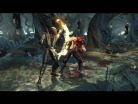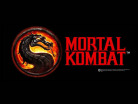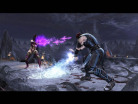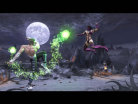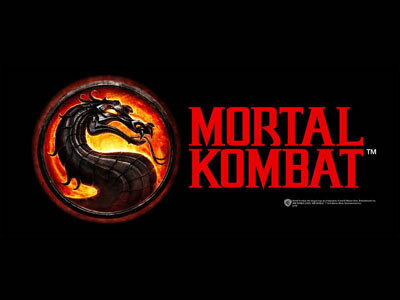- CLASSIC MAGAZINES
- REVIEW CREW
A show recapping what critics thought back
when classic games first came out! - NEXT GENERATION'S BEST & WORST
From the worst 1-star reviews to the best
5-stars can offer, this is Next Generation! - NINTENDO POWER (ARCHIVE)
Experience a variety of shows looking at the
often baffling history of Nintendo Power! - MAGAZINE RETROSPECTIVE
We're looking at the absolutely true history of
some of the most iconic game magazines ever! - SUPER PLAY'S TOP 600
The longest and most ambitious Super NES
countdown on the internet! - THEY SAID WHAT?
Debunking predictions and gossip found
in classic video game magazines! - NEXT GENERATION UNCOVERED
Cyril is back in this spin-off series, featuring the
cover critic review the art of Next Generation! - HARDCORE GAMER MAGAZING (PDF ISSUES)
Download all 36 issues of Hardcore Gamer
Magazine and relive the fun in PDF form!
- REVIEW CREW
- ELECTRONIC GAMING MONTHLY
- ELECTRONIC GAMING MONTHLY RANKS
From Mario to Sonic to Street Fighter, EGM
ranks classic game franchises and consoles! - ELECTRONIC GAMING MONTHLY BEST & WORST
Counting down EGM’s best and worst reviews
going year by year, from 1989 – 2009! - ELECTRONIC GAMING BEST & WORST AWARDS
11-part video series chronicling the ups and
downs of EGM’s Best & Worst Awards!
- ELECTRONIC GAMING MONTHLY RANKS
- GAME HISTORY
- GAME OVER: STORY BREAKDOWNS
Long-running series breaking down game
stories and analyzing their endings! - A BRIEF HISTORY OF GAMING w/ [NAME HERE]
Real history presented in a fun and pithy
format from a variety of game historians! - THE BLACK SHEEP
A series looking back at the black sheep
entries in popular game franchises! - INSTANT EXPERT
Everything you could possibly want to know
about a wide variety of gaming topics! - FREEZE FRAME
When something familiar happens in the games
industry, we're there to take a picture! - I'VE GOT YOUR NUMBER
Learn real video game history through a series
of number-themed episodes, starting at zero! - GREAT MOMENTS IN BAD ACTING
A joyous celebration of some of gaming's
absolute worst voice acting!
- GAME OVER: STORY BREAKDOWNS
- POPULAR SHOWS
- DG NEWS w/ LORNE RISELEY
Newsman Lorne Riseley hosts a regular
series looking at the hottest gaming news! - REVIEW REWIND
Cyril replays a game he reviewed 10+ years
ago to see if he got it right or wrong! - ON-RUNNING FEUDS
Defunct Games' longest-running show, with
editorials, observations and other fun oddities! - DEFUNCT GAMES QUIZ (ARCHIVE)
From online quizzes to game shows, we're
putting your video game knowledge to the test!- QUIZ: ONLINE PASS
Take a weekly quiz to see how well you know
the news and current gaming events! - QUIZ: KNOW THE GAME
One-on-one quiz show where contestants
find out if they actually know classic games! - QUIZ: THE LEADERBOARD
Can you guess the game based on the classic
review? Find out with The Leaderboard!
- QUIZ: ONLINE PASS
- DEFUNCT GAMES VS.
Cyril and the Defunct Games staff isn't afraid
to choose their favorite games and more! - CYRIL READS WORLDS OF POWER
Defunct Games recreates classic game
novelizations through the audio book format!
- DG NEWS w/ LORNE RISELEY
- COMEDY
- GAME EXPECTANCY
How long will your favorite hero live? We crunch
the numbers in this series about dying! - VIDEO GAME ADVICE
Famous game characters answer real personal
advice questions with a humorous slant! - FAKE GAMES: GUERILLA SCRAPBOOK
A long-running series about fake games and
the people who love them (covers included)! - WORST GAME EVER
A contest that attempts to create the worst
video game ever made, complete with covers! - LEVEL 1 STORIES
Literature based on the first stages of some
of your favorite classic video games! - THE COVER CRITIC
One of Defunct Games' earliest shows, Cover
Critic digs up some of the worst box art ever! - COMMERCIAL BREAK
Take a trip through some of the best and
worst video game advertisements of all time! - COMIC BOOK MODS
You've never seen comics like this before.
A curious mix of rewritten video game comics!
- GAME EXPECTANCY
- SERIES ARCHIVE
- NINTENDO SWITCH ONLINE ARCHIVE
A regularly-updated list of every Nintendo
Switch Online release, plus links to review! - PLAYSTATION PLUS CLASSIC ARCHIVE
A comprehensive list of every PlayStation
Plus classic release, including links! - RETRO-BIT PUBLISHING ARCHIVE
A regularly-updated list of every Retro-Bit
game released! - REVIEW MARATHONS w/ ADAM WALLACE
Join critic Adam Wallace as he takes us on a
classic review marathon with different themes!- DEFUNCT GAMES GOLF CLUB
Adam Wallace takes to the links to slice his way
through 72 classic golf game reviews! - 007 IN PIXELS
Adam Wallace takes on the world's greatest spy
as he reviews 15 weeks of James Bond games! - A SALUTE TO VAMPIRES
Adam Wallace is sinking his teeth into a series
covering Castlevania, BloodRayne and more! - CAPCOM'S CURSE
Adam Wallace is celebrating 13 days of Halloween
with a line-up of Capcom's scariest games! - THE FALL OF SUPERMAN
Adam Wallace is a man of steel for playing
some of the absolute worst Superman games! - THE 31 GAMES OF HALLOWEEN
Adam Wallace spends every day of October afraid
as he reviews some of the scariest games ever! - 12 WEEKS OF STAR TREK
Adam Wallace boldly goes where no critic has
gone before in this Star Trek marathon!
- DEFUNCT GAMES GOLF CLUB
- DAYS OF CHRISTMAS (ARCHIVE)
Annual holiday series with themed-episodes
that date all the way back to 2001!- 2015: 30 Ridiculous Retro Rumors
- 2014: 29 Magazines of Christmas
- 2013: 29 Questionable Power-Ups of Christmas
- 2012: 34 Theme Songs of Christmas
- 2011: 32 Game Endings of Christmas
- 2010: 31 Bonus Levels of Christmas
- 2009: 30 Genres of Christmas
- 2008: 29 Controls of Christmas
- 2007: 34 Cliches of Christmas
- 2006: 33 Consoles of Christmas
- 2005: 32 Articles of Christmas
- 2004: 31 Websites of Christmas
- 2003: 29 Issues of Christmas
- 2002: 28 Years of Christmas
- 2001: 33 Days of Christmas
- NINTENDO SWITCH ONLINE ARCHIVE
- REVIEW ARCHIVE
- FULL ARCHIVE
Mortal Kombat
Do you believe in comebacks? Even though I've always had an appreciation for Ed Boon's brutally violent fighting franchise, I'm realistic that the old Mortal Kombat games were nothing more than a guilty pleasure. This is a franchise that chose blood and gore over refined gameplay. Players didn't flock to their local arcades (and later home consoles) for the highly killed tournament play, they just wanted to see pools of blood and fatalities.
For years Mortal Kombat has been happy to play into the guilty pleasure. Instead of focusing on consistent fight mechanics, the developers instead decided to continue piling more and more brutality into the series. The end result was a franchise that took themselves too seriously and couldn't compete with most other fighting games.
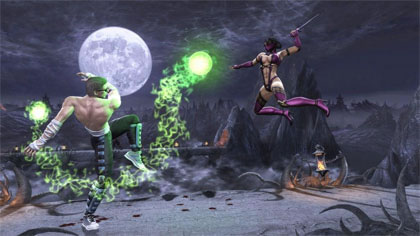
This brand new Mortal Kombat game (the ninth, not that anybody is keeping count) goes a long way to fix the wounds of past fifteen years. This is not just another sequel; this is the Mortal Kombat game I have been dreaming about since the early 1990s. This is the first installment to successfully capture the intriguing (though appropriately goofy) narrative and marry it with solid fight mechanics. And boy is it bloody. This game is overflowing with finishing moves, powerful x-ray move, stage fatalities and more. This is everything you have ever wanted in a Mortal Kombat game.
Going in I knew the game looked good, but I wondered how it would play. This is a franchise known for throwing out its old gameplay in order to make something new. Thankfully this new game harkens back to the gameplay of Mortal Kombat II. Ed Boon didn't set out to copy the feel of the old games; instead his team has crafted a mechanic that manages to feel fresh and honor the legacy. The gameplay is still not as smooth as what is found in Street Fighter IV, but it's far beyond anything we've seen in a Mortal Kombat game. I can imagine a time when this series will be taken seriously in the tournament scene. You couldn't say that about Deadly Alliance.
While much of the gameplay feels traditional, there are a number of additions that can really change the course of a fight. Mortal Kombat has a three-part power meter, which allows players to perform enhanced versions of each character's special moves. On top of that, there's an "X-Ray" attack which shows us in vivid detail exactly what happens when we're hit, stabbed and set on fire by these murderous fighters. Thanks to the much-improved graphic engine, these powerful hits make an impact. I found myself cringing while performing the x-ray attacks, some of them are as brutal as anything I've seen in this series.
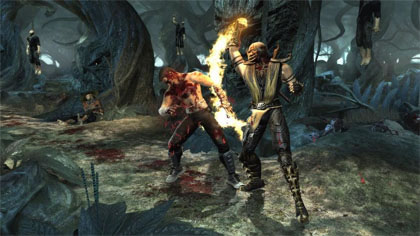
Another thing that helps sell the violence is the way the carnage sticks around. Mortal Kombat characters have always showered their opponents in blood, but now that gooey red stuff stays on the fighter. In fact, every punch, slash and stab leaves a mark. By the end of the round each fighter looks completely torn apart, making this one of the most visually satisfying fighters I've ever seen.
In a lot of ways, the new Mortal Kombat is a lot like J.J. Abrams recent Star Trek movie. Instead of starting over from scratch, the game has a conceit where a nearly defeated Raiden sends a message back to himself in the past. This vision hits Mortal Kombat 1 era Raiden, who realizes that he has to scramble and piece together a group of powerful fighters to protect the EarthRealm. He fears that if something isn't done, two realms will merge and humanity will be doomed for eternity. Earth's last hope is riding on Liu Kang, Kung Lao, Jax, Sonya and a handful of other rough and tough brawlers.
This sets into motion a narrative that effectively retells the story of Mortal Kombat 1 - 3. We're given a large cast of familiar faces, nostalgic backgrounds and the same over-the-top fun we had back in the days of the arcade. But not everything is the same. Much like the Star Trek reboot, this new game takes some liberties with the story. Mortal Kombat is full of familiar events happening in fresh new ways, along with just enough twists and turns to make this story exciting again.
In case you haven't noticed, that's a lot of story. Most fighting games have a paper-thin narrative; just enough to justify making a bunch of characters battle it out. But that's not Mortal Kombat. In this game you're given a lengthy (we're talking six - eight hour adventure) story mode that fills in the story of the first three MK releases. Through a series of chapters, we're given the ability to play as sixteen different characters and see how each of them ties into the mythology.
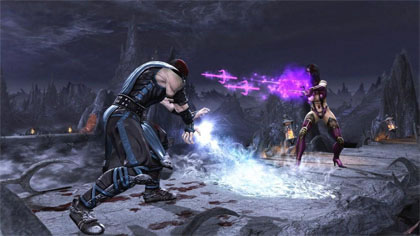
The story mode is nothing more than an interactive soap opera, one that involves lengthy cinema scenes that always result in somebody fighting somebody else. The structure may not be original, but the execution is mind boggling. Not only was Ed Boon able to tell a fairly intricate story full of intersecting characters, but he did it in a way that gave me a greater understanding of the cast as a whole. I found myself constantly impressed that I was starting to care about characters I had written off long ago. Thanks to this game I have a newfound respect for a lot of the minor characters from Mortal Kombat 3 (Stryker, Cyrex, etc.).
As impressive as the lengthy story mode is, it's really just one of the worthwhile modes found in Mortal Kombat. When you're not trying to defeat Shao Kahn once and for all, you can work your way up the 300 story tower. This mode offers fans a chance to test their skills in a number of challenging ways. While most modes require little more than you defeating your opponent, there's usually a catch along the way. Sometimes your controls will be reversed, the fight will happen on the ceiling or you won't be able to block.
That's just the start of the crazy things you'll see while climbing the tower. In one stage you'll play as Cyrex throwing bombs into a moving garbage can. In another level your arms and head will be literally chopped off before the round starts. In another stage your own attack will be to throw your arms and legs at the opponent. Some stages will test your combos; others will look for total damage. You'll often have to learn special moves and perfect the different fatalities. And best of all, these 300 stages become increasingly difficult. You really have to prove your worth if you're going to reach the top of this tower.
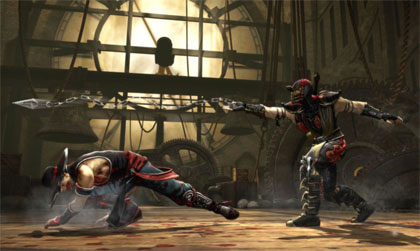
Maybe you're not the kind of person that cares about lengthy story modes and a robust challenge tower, maybe you just want to fight like the olden days. Good news, Mortal Kombat features all of the standard arcade-style modes you're used to. You can climb the single-player tower for all 28 fighters, offering a what-if scenario where that fighter wins the tournament. Fans can also go through this arcade-style mode as pairs, turning this game into a tag team affair.
If that's still not enough for you, then you should take a look at Mortal Kombat's four bonus stages. Test Your Might returns from the original Mortal Kombat and is joined by Test Your Luck, Test Your Sight and Test Your Strike. These stages will have you mashing buttons to break objects and watching a disgusting variation on the cup game.
Of the bonus stages, only Test Your Luck is the one that has legs. In this mode a large slot machine will pop up and its spin will spell out your fate. It will choose the characters, handicaps (no arms, no blocking, etc.) and stage effects. Once you have your assignment, it's up to you to overcome the challenge. This is an exciting mode that reminded me why I loved Mortal Kombat II so much. There's a randomness to all of the action that is refreshing.
With more than fifteen hours of single-player content, I can see some players going days (or even weeks) before challenging another living person. The amount of content in Mortal Kombat is staggering, and not just for a fighting game. Most modern action games and first-person shooters don't come close to offering this much stuff to do. If you're somebody who felt burned by the lack of things to do in Marvel vs. Capcom 3, then Mortal Kombat is the $60 fighting game you can feel good about buying.
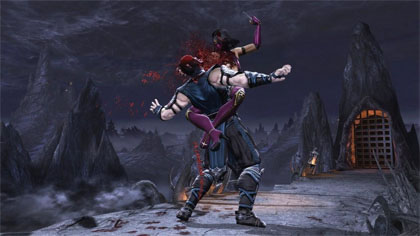
On top of the game's strong single-player content, there are also a few worthwhile multiplayer modes. Players get the usual one-on-one battles, along with the tag team variation. The game also allows you to input codes (like those found in Mortal Kombat 3) to change up the handicaps. Parties can even get involved in a brand new four-player mode, though that restricts the game to the two-on-two variation. There's also an online mode that boasts a number of ways to play. Unfortunately I have no firsthand experience with this mode as Sony's PSN service has been down since launch.
Just about everything you do in Mortal Kombat earns you coins. Much like past entries, this game offers a giant Krypt, where players use their newfound money to unlock new fatalities, costumes, music and more. While there's nothing earthshattering in this mode, I was impressed with the amount of old school content I recognized. It was great to hear some of the original music; it perfectly fits the many stages influenced by the first three games. If any series deserved this much fan service, it's Mortal Kombat.
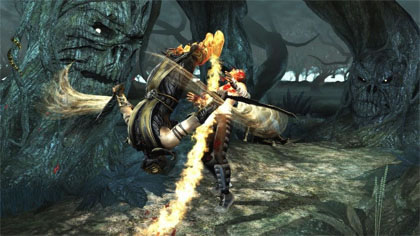
There's no question that this game mashes that nostalgia button. So much of this game feels like it was ripped directly out of the first three games, from the characters to the stages. Outside of the weird stunt casting of Kratos, there aren't many new faces in this ninth Mortal Kombat game. The stages are also familiar, including a haunted forest, the courtyard, Goro's lair, a bunch of pits and many more. All of this works for this reboot, but I can't wait to see this team push this fiction forward in new and interesting ways.
Mortal Kombat isn't just a solid reboot of a beloved franchise; it's also one of the best fighting game of the year. NetherRealm Studios has finally made Mortal Kombat relevant. This is a package with an enviable amount of content, including a story mode that truly ups the ante for all fighting games in the future. If this is the new direction for this franchise, then I definitely want more Mortal Kombat!
HOME |
CONTACT |
NOW HIRING |
WHAT IS DEFUNCT GAMES? |
NINTENDO SWITCH ONLINE |
RETRO-BIT PUBLISHING
Retro-Bit |
Switch Planet |
The Halcyon Show |
Same Name, Different Game |
Dragnix |
Press the Buttons
Game Zone Online | Hardcore Gamer | The Dreamcast Junkyard | Video Game Blogger
Dr Strife | Games For Lunch | Mondo Cool Cast | Boxed Pixels | Sega CD Universe | Gaming Trend
Game Zone Online | Hardcore Gamer | The Dreamcast Junkyard | Video Game Blogger
Dr Strife | Games For Lunch | Mondo Cool Cast | Boxed Pixels | Sega CD Universe | Gaming Trend
Copyright © 2001-2025 Defunct Games
All rights reserved. All trademarks are properties of their respective owners.
All rights reserved. All trademarks are properties of their respective owners.






